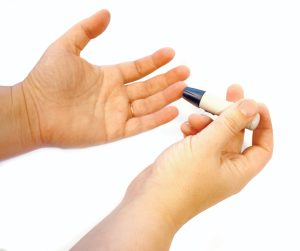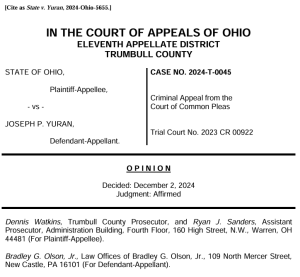 The headline from a recent article read, “Narcotics-based OVIs Rise in Ohio”. A police officer interviewed for the article said he has observed an increase in the number of drug-related OVIs. A representative of the Ohio State Highway Patrol reported fatal marijuana-related crashes rose 52% from 2019 to 2023. To combat this problem, Ohio law enforcement agencies are now using oral fluid testing to help determine intoxication from marijuana and other drugs.
The headline from a recent article read, “Narcotics-based OVIs Rise in Ohio”. A police officer interviewed for the article said he has observed an increase in the number of drug-related OVIs. A representative of the Ohio State Highway Patrol reported fatal marijuana-related crashes rose 52% from 2019 to 2023. To combat this problem, Ohio law enforcement agencies are now using oral fluid testing to help determine intoxication from marijuana and other drugs.
Continue Reading
Expert Testimony and Jury Instructions in Ohio Vehicular Homicide Cases
 A recent appellate case involves two legal issues which are often litigated in Vehicular Homicide and Vehicular Assault cases in Ohio. The first issue is the admissibility of expert witness testimony. The second issue is whether the jury should be instructed about the option of finding the defendant guilty of a lesser offense. The case is State v. Horst.
A recent appellate case involves two legal issues which are often litigated in Vehicular Homicide and Vehicular Assault cases in Ohio. The first issue is the admissibility of expert witness testimony. The second issue is whether the jury should be instructed about the option of finding the defendant guilty of a lesser offense. The case is State v. Horst.
Can You Be Charged with DUI/OVI in Ohio While Camping in an RV?
 Imagine you are camping in your RV and enjoying some adult beverages. A police officer approaches your RV, and you are sitting in the driver’s seat with the keys in the ignition. The officer smells the odor of alcohol and asks you to get out for sobriety testing. The next thing you know, you are facing a charge of DUI (called ‘OVI’ in Ohio). Could this happen?
Imagine you are camping in your RV and enjoying some adult beverages. A police officer approaches your RV, and you are sitting in the driver’s seat with the keys in the ignition. The officer smells the odor of alcohol and asks you to get out for sobriety testing. The next thing you know, you are facing a charge of DUI (called ‘OVI’ in Ohio). Could this happen?
Hyperglycemia and DUI / OVI in Ohio
 A previous article in this blog discussed the potential impact of hypoglycemia (low blood sugar) on an investigation for DUI (called ‘OVI’ in Ohio). Hypoglycemia is not the only blood sugar condition which may affect an OVI investigation. Hyperglycemia (high blood sugar) may also cause symptoms which overlap with the symptoms of alcohol intoxication. In addition, hyperglycemia may inflate the results of a breath alcohol test.
A previous article in this blog discussed the potential impact of hypoglycemia (low blood sugar) on an investigation for DUI (called ‘OVI’ in Ohio). Hypoglycemia is not the only blood sugar condition which may affect an OVI investigation. Hyperglycemia (high blood sugar) may also cause symptoms which overlap with the symptoms of alcohol intoxication. In addition, hyperglycemia may inflate the results of a breath alcohol test.
Repeat DUI/OVI Compared to First-Offense DUI/OVI in Ohio
 With St. Patrick’s Day around the corner, many people in Ohio will be celebrating at bars. Most of those people will drive home, and some of those people will be arrested for DUI (called ‘OVI’ in Ohio). How many of those arrests will involve drivers who have already been convicted of OVI at least once? How are repeat OVI offenses in Ohio treated differently than first offenses?
With St. Patrick’s Day around the corner, many people in Ohio will be celebrating at bars. Most of those people will drive home, and some of those people will be arrested for DUI (called ‘OVI’ in Ohio). How many of those arrests will involve drivers who have already been convicted of OVI at least once? How are repeat OVI offenses in Ohio treated differently than first offenses?
Former Trooper Appeals Sentence for Vehicular Homicide
 A former Pennsylvania state trooper was involved in a two-vehicle automobile crash, and the driver of the other vehicle died as a result. The former trooper, Joseph Yuran, was charged with Aggravated Vehicular Homicide as a second-degree felony and Operating a Vehicle under the Influence (OVI). Yuran pled guilty to those charges, and the judge imposed a prison term of 7 years to 10.5 years. Yuran appealed the sentence to the 11th District Court of Appeals, claiming the sentence was unlawful.
A former Pennsylvania state trooper was involved in a two-vehicle automobile crash, and the driver of the other vehicle died as a result. The former trooper, Joseph Yuran, was charged with Aggravated Vehicular Homicide as a second-degree felony and Operating a Vehicle under the Influence (OVI). Yuran pled guilty to those charges, and the judge imposed a prison term of 7 years to 10.5 years. Yuran appealed the sentence to the 11th District Court of Appeals, claiming the sentence was unlawful.
Ohio DUI/OVI Law Set to Change
 The law governing DUI (called ‘OVI’ in Ohio) is going to change. House Bill 37, signed by Governor Mike DeWine, becomes law on April 9, 2025. The legislation changes four separate areas of law: (1) Driving privileges and ignition interlock devices for OVI license suspensions; (2) Financial penalties for OVI convictions; (3) Oral fluid testing in OVI cases; and (4) Aggravated Vehicular Homicide penalties when a defendant has prior OVI convictions. This article addresses the changes in that order.
The law governing DUI (called ‘OVI’ in Ohio) is going to change. House Bill 37, signed by Governor Mike DeWine, becomes law on April 9, 2025. The legislation changes four separate areas of law: (1) Driving privileges and ignition interlock devices for OVI license suspensions; (2) Financial penalties for OVI convictions; (3) Oral fluid testing in OVI cases; and (4) Aggravated Vehicular Homicide penalties when a defendant has prior OVI convictions. This article addresses the changes in that order.
Seminar: Negotiations in DUI / OVI Cases
 Many continuing legal education seminars teach the art of trial skills. In the area of DUI (called ‘OVI’ in Ohio), fewer than five percent of cases go to trial, but 100% of cases involve negotiation. For the first time, the National College for DUI Defense (NCDD) held a seminar to improve negotiation skills. The presentations provided valuable insight, and three of them stood-out to me.
Many continuing legal education seminars teach the art of trial skills. In the area of DUI (called ‘OVI’ in Ohio), fewer than five percent of cases go to trial, but 100% of cases involve negotiation. For the first time, the National College for DUI Defense (NCDD) held a seminar to improve negotiation skills. The presentations provided valuable insight, and three of them stood-out to me.
Running Over a Stray Cat May Be a Felony
 A driver ran a stop sign, ran from a cruiser, and ran over a cat. The cat died as a result. According to the Dayton Daily News, the driver was charged with multiple felony offenses. One of the felony charges involves prohibitions concerning companion animals. Is it really a felony to hit and kill a stray cat?
A driver ran a stop sign, ran from a cruiser, and ran over a cat. The cat died as a result. According to the Dayton Daily News, the driver was charged with multiple felony offenses. One of the felony charges involves prohibitions concerning companion animals. Is it really a felony to hit and kill a stray cat?
Multiple Vehicular Homicide Charges from One Collision
 According to this news article, a truck driver lost control of his truck, collided with four other vehicles, and caused the deaths of three people. The truck driver was charged with three counts of Aggravated Vehicular Homicide, three counts of Vehicular Manslaughter, and three counts of DUI (called ‘OVI’ in Ohio). Why was the truck driver charged with multiple offenses, and can he be sentenced on all the charges?
According to this news article, a truck driver lost control of his truck, collided with four other vehicles, and caused the deaths of three people. The truck driver was charged with three counts of Aggravated Vehicular Homicide, three counts of Vehicular Manslaughter, and three counts of DUI (called ‘OVI’ in Ohio). Why was the truck driver charged with multiple offenses, and can he be sentenced on all the charges?
 Columbus OVI/DUI Attorney Blog
Columbus OVI/DUI Attorney Blog

